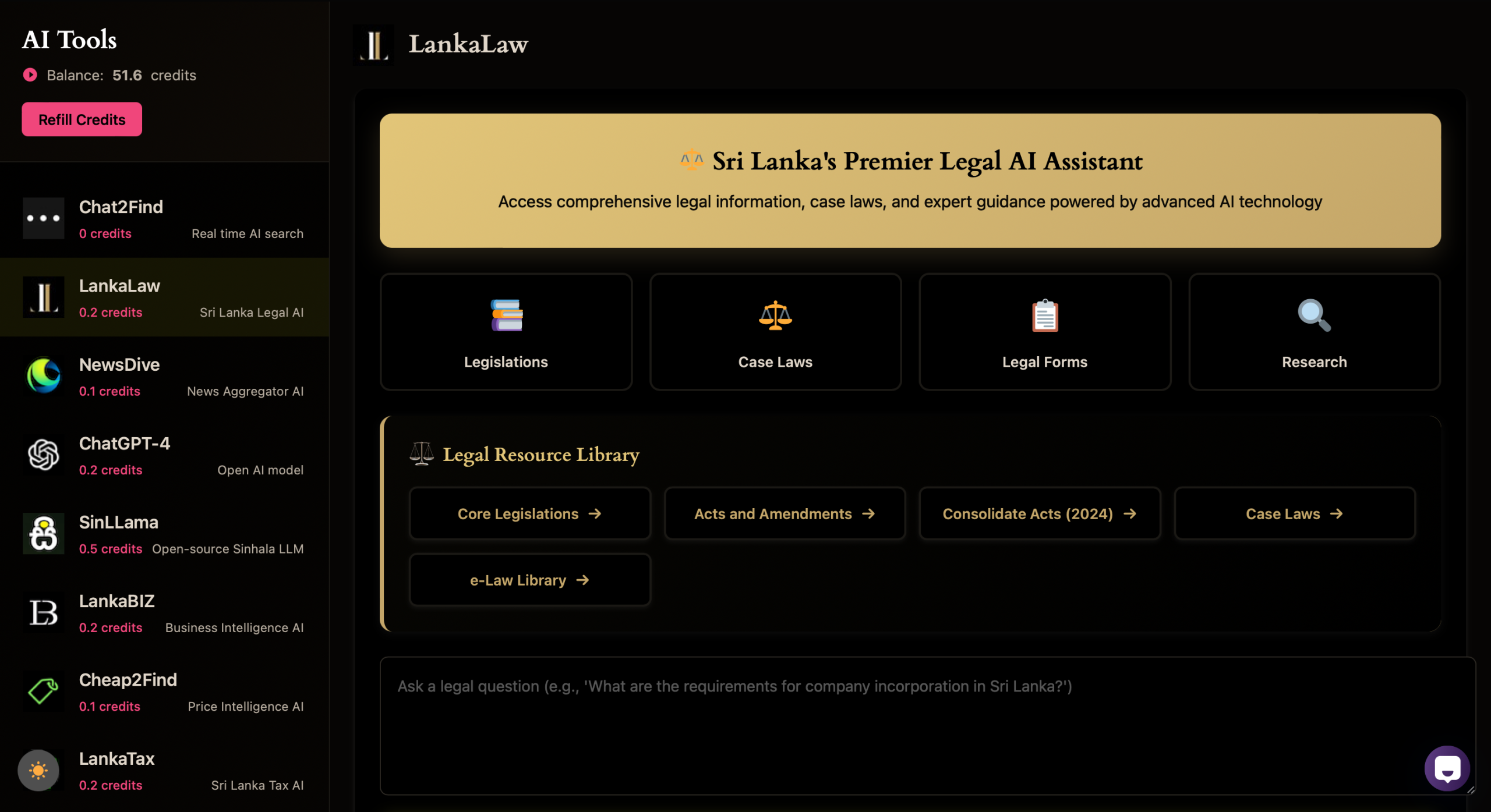Category: Legal Research
-
LankaLAW Now Available on AI Mart – Expanding Access to AI-Powered Legal Research in Sri Lanka

Colombo, Sri Lanka – October 13, 2025 – In a major milestone for Sri Lanka’s legal technology landscape, LankaLAW, the country’s first publicly launched AI platform for legal research and analysis, is now officially available on AI Mart (www.aimart.lk), the nation’s leading online marketplace for AI solutions, products, and services. Developed by Chat2Find, LankaLAW revolutionized the way legal professionals access and
-
Affidavits: Legal Principles, Case Law, and Key Judgments

Introduction An affidavit is a written statement sworn to be true by the deponent, used as evidence in legal proceedings. Affidavits play a crucial role in both civil and criminal cases, serving as evidence in court, administrative proceedings, and business transactions. This article explores the legal principles surrounding affidavits, significant case law, and key judicial
-
Administrators and Executors in Sri Lanka: Legal Framework and Case Law

Introduction In Sri Lanka, the roles of administrators and executors are crucial in managing and distributing the estate of a deceased person. Their legal standing, responsibilities, and duties are guided by statutory laws and judicial precedents. This article delves into the administration of estates under Sri Lankan law, highlighting key legal principles and relevant case law.
-
Proof of Shipment Under Letter of Credit Transactions: Expectations of Banks

A Letter of Credit (LC) is a financial instrument issued by a bank at the request of a buyer to guarantee timely payment to a seller upon the presentation of specified documents. This mechanism ensures compliance with agreed terms, offering a layer of security for international trade transactions. Despite its efficiency, Letters of Credit operate
-
A Comparative Analysis of Time Limits for Employee Relief Applications

Time limitations regarding applications for relief following employment termination have become critical in industrial law. These limits are designed to ensure timely recourse while preventing administrative delays. This article examines the evolution of time limits in Sri Lanka, their implications for employees and employers, and proposes recommendations for reform to address existing challenges. Historical Context
-
Freedom of Expression and the Right to Information: Pillars of Democracy and Good Governance

Freedom signifies the absence of control, interference, or restriction. Within this context, freedom of expression refers to the unrestrained ability to articulate one’s views, ideas, emotions, and thoughts. However, this right must coexist harmoniously with other universal freedoms, necessitating reasonable limitations to protect public interest, societal order, and individual rights. Historical Evolution of Freedom of
-
Smuggling of Human Cargo and Liability Issues: Perspectives in International Law

Illicit or irregular migration is a global phenomenon, often analyzed from the perspective of the destination country. However, it is inherently a multilateral issue involving countries of origin, transit, and destination. Origin countries are implicated when individuals leave without valid travel documentation. Transit countries face challenges when migrants lack proper transit visas, while destination countries
-
Corporate Takeovers: Regulatory Frameworks, Challenges, and International Comparisons

Corporate phenomena such as takeover offers—exemplified by Hatton National Bank’s bid for control of the Commercial Bank of Ceylon and the contest between Vanik Incorporated Ltd and Asia Capital Ltd over Forbes Ceylon Ltd—highlight the importance of regulatory frameworks like the Company Takeovers and Mergers Code of Sri Lanka. This code, introduced by the Securities
-
Contracts of Employment and Unfair Dismissals: An Evolving Landscape

Contracts of employment represent more than mere agreements between two parties; they are a critical framework for balancing rights, obligations, and expectations within the industrial and economic fabric of society. The evolution from a master-servant relationship to one governed by legal principles of equity and fairness underscores the increasing recognition of employees’ rights and the
-
Terminating a Company’s Existence

The termination of a company’s existence is a structured and legally governed process aimed at ensuring fairness, transparency, and adherence to statutory obligations. This article delves into the various methods by which a company can cease to exist under the Companies Act No. 17 of 1982, detailing the processes of cancellation of registration, removal of
-
Stamping of Documents in Legal Proceedings

Stamp duty represents a pivotal element in the legal framework, serving as a form of taxation on specific documents to ensure their validity and enforceability. Governed initially by Ordinance No. 22 of 1909, the regulation of stamp duty underwent significant transformations. These culminated in the enactment of the Stamp Duty Act No. 43 of 1982,
-
The WTO, Labour Standards, and National Legislation: A Comprehensive Perspective

The post-World War I establishment of the International Labour Organisation (ILO) in 1919 was a landmark event in the history of global labour rights. Arising from the upheavals of war and class struggles, the ILO was tasked with promoting social justice and improving working conditions worldwide. Central to its mandate, as articulated in the 1944
-
Insider Dealing in the Information Age

In the modern financial landscape, the importance of information cannot be overstated. Insider dealing, a term synonymous with the misuse of privileged information, has become a focal point of legal and ethical scrutiny in the information era. This offense, which once seemed overshadowed by tangible property crimes like theft and embezzlement, now commands equal, if
-
Registration of Title: Resolving Land Ownership Challenges in Sri Lanka

Land ownership plays a pivotal role in economic development, individual wealth creation, and social stability. In Sri Lanka, however, the challenges of co-ownership, unclear titles, and persistent legal disputes have historically hindered land’s economic utility. The Registration of Title Act, No. 21 of 1998, marks a transformative step toward addressing these long-standing issues by introducing a
-
Electronic Signatures: Perspectives, Challenges, and Solutions

In the digital age, where commerce and communication increasingly occur online, traditional methods of authentication, such as handwritten signatures, are being replaced by electronic signatures. This shift has prompted legal and technical challenges, requiring courts and legislatures worldwide to adapt. As e-commerce becomes a dominant driver of economic activity, the need for robust electronic signature
